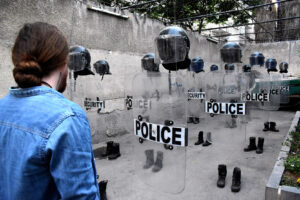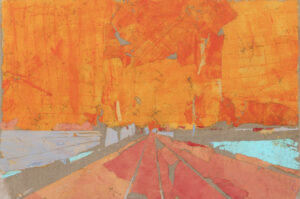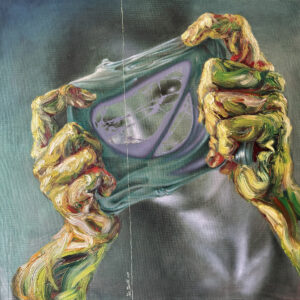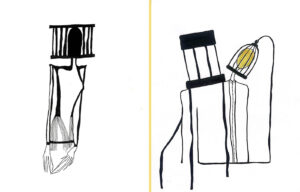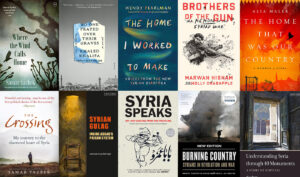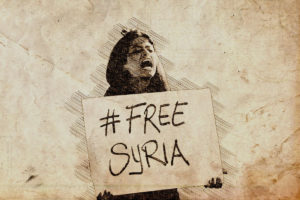Raqqa, Syria before the start of the civil war, in 2010.
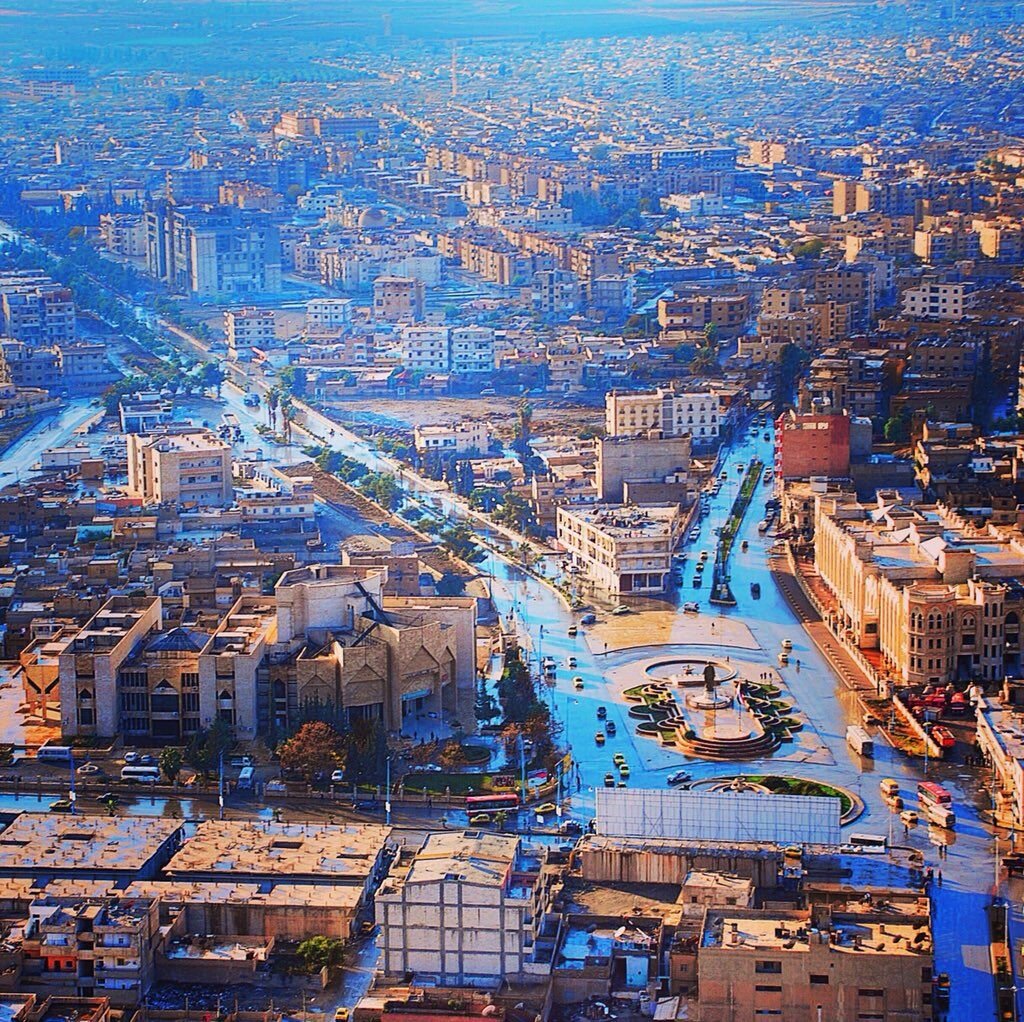 <
<
Summer With the Enemy, a novel by Shahla Ujayli
Translated by Michelle Hartmann
Interlink Books 2020
ISBN 9781623718671
Just out from Interlink Books—one of the most venerable of smaller independent publishers in the United States to feature a major collection of Middle East/Arab and Iranian literature—comes Syrian writer Shahla Ujayli’s new novel, Summer with the Enemy. The book traces the lives of women not only in Raqqa where the bulk of the novel is set, but also in the places their families lived before — Turkey, Jerusalem, Aleppo and Damascus. It reminds us that Syria and Syrians have never been isolated from the world, and that indeed the lives of people stretched far beyond the confines of Raqqa’s city limits, long before the online world existed.
A Silent Crime
an excerpt from Summer With the Enemy
By Shahla Uyali
Shahla Ujayli’s Summer With the Enemy is available from Interlink Books.
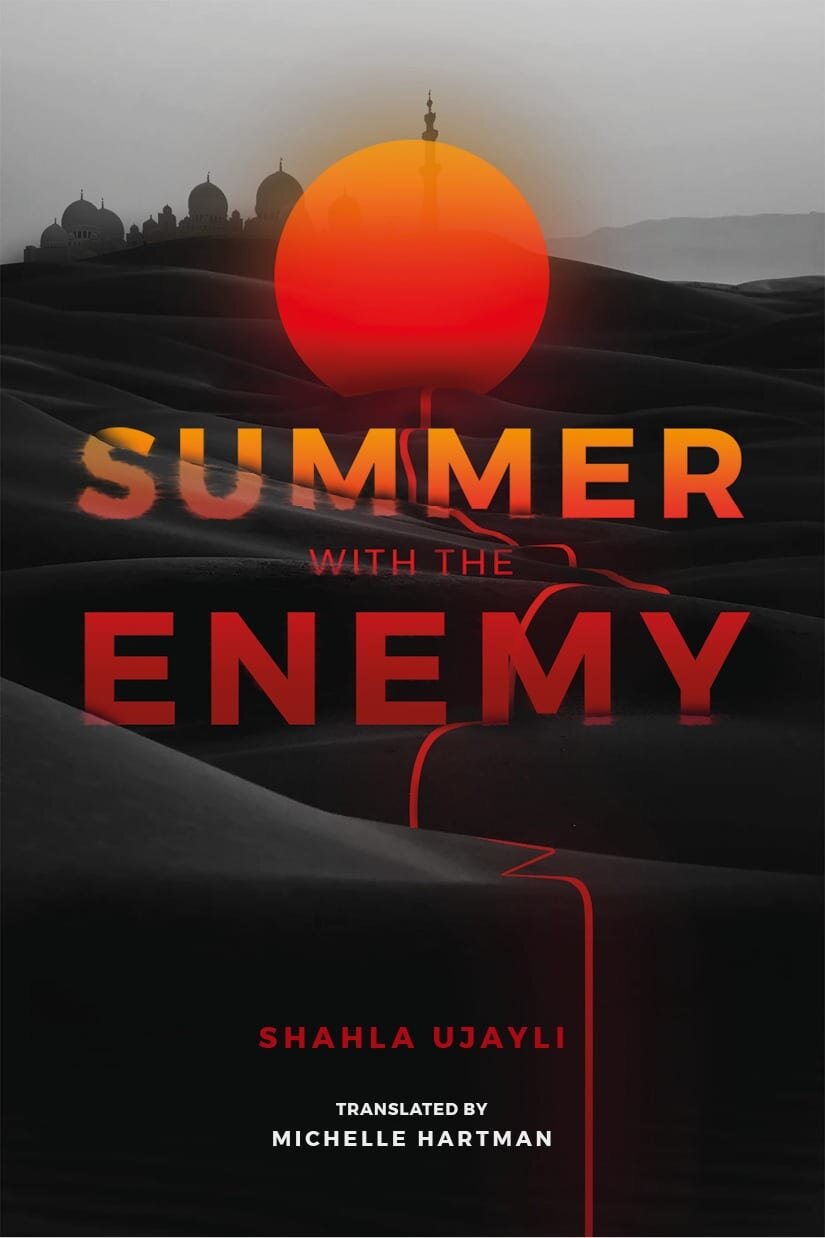 <
<
HE REACHED behind the white organza curtain trimmed with embroidered silver roses to close the window. The long edges of this white wood-framed, rectangular window run down the wall like two columns. The glass is divided into a grid of eight thick square panes. A cold southern wind was blowing in from the Rhine, carrying on it the mingled scents of metal riverboat ferries, charcoal-roasted fish from nearby sidewalk cafés, and the humidity of the previous night’s rainfall. The river could be spotted between the domed bridges running along Rhineover Street.
He leaned his body slightly forward to reach the edge of the window and his chin brushed against the top of my forehead. Though almost theatrically smooth, his sudden movement startled me. I had been in a deep sleep, my body cradled in his right arm and my face nestled in the crook of his neck, which gave off the warm scent of musk and mulberries. I tried to ignore it, searching for his natural scent, redolent of my faraway childhood.
Actually, so that we could have some time alone before I left for Munich, I’d rushed to meet him so quickly that I didn’t even have time to dye my hair. White roots have started to peep through again and this is totally incompatible with how old I feel and the youthful spirit I harbor inside me.
I hadn’t realized that Abboud lived right across from the municipal building on Port Street. I’ve passed by here every day for three days. I’ve walked down the sidewalk, following people setting off to work on foot or bicycles. Cologne had very few cars for such a big city. You never felt you had to leave early because the traffic would likely make you late for an important meeting. Many different kinds of tourists regularly descended on the old city, as did the foreigners—I had decided to call the refugees foreigners.
The day before, I’d sat in the café that the very window I’ve just described looks out onto. I enjoyed a delicious coffee and lunched in the restaurant next door. It was an excellent restaurant and the meal wasn’t pricey. I usually sat with my back to the old brick building beside it, and looked out at the bridge instead. I’ve always loved bridges—they make return a possibility no matter how much time has passed! As I stood up to leave, the building whose third-floor apartment I am now staying in captivated me. I was taken by the little crystal pendant lights emitting a diffuse yellow glow, the classic organza curtains I was now resting behind, and the Opaline chandelier on the first floor that must have been produced at the beginning of the twentieth century. It illuminated a table with a white tablecloth, atop which passersby could spot a bowl with untouched red apples and green grapes, so perfect they looked plastic. I was secretly jealous as I wondered: Who lives there? It must be locals, settled people—Germans with families nearby. They own their apartments, having bought or inherited them. They have relatives and friends who visit and they spend pleasant evenings together on the riverbanks. Foreigners don’t live in the center of the old town—their places are far removed, on the outskirts of big cities, in little villages, virgin forests, lands where there are few people. These are neutral places we regularly pass by, be it by habit or chance, which have no particular appeal and hold no special meaning for us. We may like them or hate them, or want to go in and buy them. We may even fear them. Then in the blink of an eye they can even become our own special places, and we create our own stories about them.
Abboud apologized for disturbing me and nestled me in his arms again, cradling me back to sleep. But I started rambling, telling him I’d seen him in my sleep, in a dream:
“Do you remember Bushra?”
“Bushra…? Oh yes, Bushra, of course, Khalil’s wife?”
“She passed away…”
“Oh God! May she rest in peace,” he said, voice full of sleep.
He didn’t ask me how she’d passed. I didn’t volunteer any information because most of the people we knew who’d passed away recently had died for reasons related to the war. But he and I were surely thinking the same thing. The day Bushra and Khalil got married I was ten, and Abboud was two years older than me. Like most other summer nights, we were playing outside with the neighborhood children when the wedding party arrived, clapping and singing in the street. We followed them to the party, clapping along. When we got too close, Amm Ismail, the father of the groom, shooed us away from the dabke troupe with his cane, to allow the circle of professional dancers to join together. We were all in the wide open-air courtyard facing their circular garden, filled with orange, apple, and lemon trees, as well as red and white Damask rose bushes. This courtyard was surrounded by their five-room house. Some of us rushed to mimic their dabke dance at the edge of the patio area where there was a large bathroom, a half bathroom, and a kitchen. But our dabke ended up a chaotic swirl, some legs thrown up in the air and others landing hard on the ground with no attention to rhythm, like children’s dabkes often are. The newlyweds went up to their private chamber just after midnight.
The next morning, at perhaps six, I awoke and looked out at the neighborhood. Abboud was sitting outside alone on an iron barrel my father had left in front of the house. Our place was on the corner of a street with three other streets branching off from it. My father had left the barrel there to prevent speeding cars from running into the wall and damaging it. I washed my face and got dressed quickly to go out and catch up with Abboud. We entered through the main door of Amm Ismail’s house and walked up the still-untiled, unpainted concrete staircase leading to the roof. Khalil had built three rooms for himself on top of his parents’ house. The window was open and we peered in to spot the two of them naked. They were holding each other and sleeping peacefully. Bushra’s body was pale, white, firm, beautiful—it was the first time I’d seen a naked woman, except for Granny Makkia—one of our elderly neighbors—whose body was tiny and flaccid. We’d started helping her shower in our bathroom after she had no one left to help her out.
After their honeymoon, when Khalil would leave for work, we’d steal in and sneak peeks from behind the door at Bushra bidding him farewell. We’d glimpse a wisp of a shiny silken nightdress—red, pink, or blue—and sometimes we’d make out a section of eggshell-colored thigh, or a freshly manicured crimson toenail. We’d each silently wonder: how could Khalil leave such beauty and go off to work? Would he ever find it mundane to spend the night with her?
I looked over at Abboud’s smiling face, his eyes closed. He laughed his old laugh, while trying to conceal an endearing boyishness and instinctive embarrassment. It came out stifled and halfhearted, and I surmised that he was thinking about that night. Abboud and I share many secrets, and what we saw of their wedding night-nakedness is not even the most risqué.
As soon as summer came, we always scattered through the neighborhood, like birds escaping their cages. Nothing and no one could stop us—not the neighbors’ shouting at us to move away from their cars or out from under their windows, nor their scolding us for walking with our muddy shoes on their freshly washed sidewalks or on the still-wet, newly laid pavement. We took those shouts and threats as friendly warnings, and responded immediately. We would slow down and lower our voices. But then we’d forget and start darting around again a minute later.
We ran through the streets, drew with chalk on the sidewalks, and rode our bicycles around. Two of us in the front, three in the middle, and two behind, then we would switch places. I liked being with Abboud even if we didn’t talk at all. I always felt like he was on my side, that he understood me and would defend me if the need ever arose. He knew everything about my difficult family life and never used it against me, whatever bone of contention might have arisen
between us. I was curious about his feelings for me, and I wished I could ask him about it, but our conversations never led in that direction. We simply played together. We were always on the same team—cops or robbers, it didn’t matter. I admit that back then I loved him a lot, and at a certain point he became the only thing I thought about. It’s not uncommon: younger children are often taken with older children, always trying to impress them. I don’t remember exactly what I used to do to get his attention, but I tried many things. Perhaps he didn’t notice any of it, though I can’t be sure because boys think in ways unfathomable to even the most experienced girls. This confusion persists even after we become mature men and women, and then later old people. But it was because of him that I paid attention to music and Einstein, or “Ayn Stayn,” in the American way he used to pronounce it.
His mother allowed him to come out and play only for short periods, and strictly forbade it on school days. In the summer, he could only play with us for two hours in the afternoon, according to her rules, but he’d often ignore her and come outside anyway. He traveled with her to his grandfather’s house in Czechoslovakia for a month every summer. That’s when everything became bleak and summer vacation would turn into a nightmare. Everything felt empty and boring even though there were other boys and girls teeming around the neighborhood like ants. When the university students returned to Raqqa from Aleppo and Damascus, they would sit around on moonlit evenings and talk about their studies and faraway girlfriends. Men and women gathered and chatted in front of their houses until dawn, but I missed Abboud, every single day from morning to evening, and waited on tenterhooks for his return.
Abboud’s father, Doctor Asahd, had studied veterinary medicine at Brno University, southeast of Prague in Czechoslovakia. He brought his beautiful colleague Anna back home with him as his wife. Everyone loved her, including me. I really admired her, even though she was the one who made me feel the distance separating me and Abboud, and pushed me away from him and their world if I got too close. She dragged him upwards, to Europe, and left the rest of us to wade through the muddy 1980s of our developing country. When he used to show me pictures of them on the Charles Bridge or at his grandparents’ house in the old city of Staré Město, my heart would pound in my chest, sad about our impending separation. I decided to study hard so I could get a scholarship and follow him wherever he went. Then someday, I would be able to stroll with him along all fifteen bridges that crossed the Vltava River. He’d drape his arms over my shoulder as we meandered down the Saints’ Road from the old city to the castle. We’d take a picture as a memento which we’d display on a table in our house, as well as a picture of us next to the statue of Christ on the cross on the Charles Bridge, written above him in Hebrew: “Holy Holy Holy is Jesus Christ the Messiah.” These words were a punishment for a Jewish Rabbi who’d ridiculed Christ, refusing to take his hat off in front of him, Abboud told me.
The men who’d studied in Eastern Europe in the 1970s formed a sort of commune, their own little private club, in Raqqa. They had gone to the Soviet Union—Czechoslovakia, Hungary, Bulgaria, Romania, Poland, and East Germany. All of these countries were friendly with Syria, and they offered each other mutual support in their liberatory struggles for socialism and democracy against capitalism and imperialism. These men married beautiful women, who bore them lovely boys and girls we called the “foreign women’s children.” They were clean, tidy, polite, and serious in their studies. They cared about music and literature, and usually had some kind of pet—a dog or a cat.
Those Muslim children went to church with their mothers and celebrated their birthdays at home in their small modest houses, near the al-Thakanah or al-Dariyiyah neighborhoods. Their homes were cozy and displayed a mix of elegance, good taste, and practicality. Everything was in its place and there was no excess. These families would visit each other regularly and spend evenings at each other’s houses—we would hear about it from their children at school. Their food had a different taste than our Arab food, and their drinks weren’t like araq or whiskey, which people bought from Abu Ibrahim’s liquor shop wrapped up in brown paper bags. They brought wine back with them from the Caucus Mountains in Georgia, and vodka from cooperatives in Moscow. When the vodka ran out, the doctors, engineers, and pharmacists concocted similar things locally, thereby transforming themselves into winemakers and creating a carnivalesque atmosphere of laughter, song, and friendly quarrels. They brought home lots of potatoes, boiled them, mashed them, then added barley to them. Everything was produced locally in Raqqa, the best there was. They would stir the mix, let it cool a little, and then add yeast to it. After a few hours, when the first carbon dioxide bubbles appeared, they would cheer and shout. About four days later, they would prepare some filters for the distillation process and Doctor Asahd would begin the work he was known for, as an artisan of good taste, repeating the process until the purity of the drink was deemed satisfactory. He reduced the sharpness for those who preferred it lighter, by treating it with baking soda.
During the season, Abboud and I used to be tasked with rushing to blind Attar’s shop in Suq al-Sharqi to bring the men anything that was missing in their recipe: yeast, baking soda, barley, dried orange peel… This whole process allowed the men to travel back in time to their days studying in the land of snow, fur coats, and sweet potatoes! Abboud used to tell me that Mendeleev, the person who created the periodic table of chemical elements, was the one who calculated the relative ratio of water to alcohol in order to create the best vodka. This kept evolving until it was patented in 1894, with the name Russian Standard Vodka—greatly contributing to the development of the Russian economy. I nodded my head, taken by the colors of Abboud’s world. Like him, I grew to love perfumed tea and despise Coca-Cola. Those families gave our little town of Raqqa wings!
After each of his trips to his grandfather’s house he brought me back gifts. Once it was a little ceramic traditional house with a pointed roof that broke a week after I got it, another time a silver necklace with a picture of the Virgin Mary with a sad, downturned head that I lost with the passing of time. Yet another time he gave me a doll dressed in traditional Czech clothes—a bright white cotton dress with a royal blue velvet dress over it embroidered in gold. She had two thick black braids and wore a velvet cap. We called her Natasha and I kept her by my side right up until I left Raqqa. Once he gave me a silver ring with a green gemstone that his mother had left behind and I considered a token of our eternal bond. When we broke up, the ring stayed in an old, empty powder box. Later on when I came across it by chance, I barely even remembered Abboud or the reason I’d kept this rusty tin ring.
<





